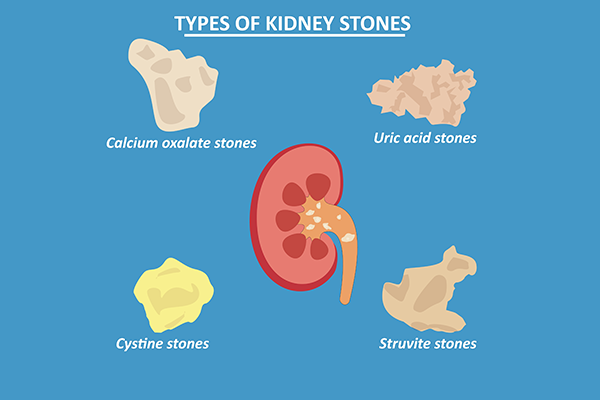
Kidney stones are a common health issue that affects people of all ages and regions. If someone experiences kidney stone symptoms such as severe back or abdominal pain, burning during urination, or blood in the urine, seeking expert medical advice is crucial.
Our urologist in Ranchi specialise in diagnosing and managing various types of kidney stones with personalised kidney stone treatment plans tailored to individual needs. Understanding what causes kidney stones and the different types of kidney stones guides effective kidney stone treatment and prevention strategies.
This blog also discusses the 4 methods for kidney stone removal and the role of the kidney stone operation in managing this condition.
Synopsis
Types of Kidney Stones
There are four primary types of kidney stones, each formed from different substances. Our urologists in Ranchi emphasise the importance of identifying these types of kidney stones to determine the best treatment approach.
1. Calcium Stones
Calcium stones are the most common type of kidney stones. They usually consist of calcium oxalate, but can also be calcium phosphate. These stones develop when urine has excess calcium combined with oxalate or phosphate.
Factors contributing to these stones include a diet high in oxalate-rich foods, dehydration, and certain medical conditions. Patients are advised to drink plenty of water and limit foods like spinach, nuts, and tea to manage these stones.
2. Uric Acid Kidney Stones
Uric acid kidney stones form when urine is persistently acidic, and are often seen in people with diabetes, gout, or those who consume a lot of animal protein. Excess uric acid crystallises into stones when not adequately dissolved.
Treatment includes alkalizing the urine with medication and dietary changes to reduce purine intake.
3. Struvite Stones
Struvite stones occur primarily in individuals with urinary tract infections. They form from magnesium, ammonium, and phosphate in an alkaline urine environment caused by bacterial infections.
These stones can grow rapidly and become very large. Treatment often requires both antibiotic therapy and a kidney stone operation or removal process.
4. Cystine Stones
Cystine stones are rare and result from a hereditary disorder causing excess cystine to leak into the urine. These stones tend to form at a young age and can be difficult to manage. Patients are encouraged to drink large volumes of water and may require medication to prevent stone formation. We provide comprehensive care for cystine stone patients, including genetic counselling.

Kidney Stone Symptoms
Recognising kidney stone symptoms early plays a critical role in timely diagnosis and treatment. Symptoms commonly include severe pain in the lower back or side, pain radiating to the groin, painful urination, nausea, vomiting, and cloudy or foul-smelling urine. If left untreated, stones may cause urinary obstruction or infection, requiring urgent medical attention from our urologists in Ranchi.
What Causes Kidney Stones?
Understanding what causes kidney stones helps tailor prevention and treatment. Common causes include dehydration, diets high in salt or animal protein, obesity, certain medications, and genetic predispositions. Our urologists in Ranchi carefully assess each patient’s risk factors for personalised lifestyle and medical guidance.
How Kidney Stones Treatment Works
Kidney stone treatment varies based on the stone type, size, and symptoms. Small stones often pass naturally with adequate hydration and pain relief. Larger or problematic stones may require medical intervention. We always use state-of-the-art diagnostics to decide on the best course.
4 Methods for Kidney Stone Removal
We employ the following kidney stone operation and removal techniques depending on the clinical scenario:
1. Extracorporeal Shock Wave Lithotripsy (ESWL)
This non-invasive treatment uses shock waves to break larger stones into smaller fragments that can be naturally passed through urine.
2. Ureteroscopy and Laser Lithotripsy
A thin scope is inserted through the urinary tract to locate and fragment the stone using laser energy, ideal for stones stuck in the ureters or kidney.
3. Percutaneous Nephrolithotomy (PCNL)
For very large or complex stones, a small incision is made in the back to remove stones directly from the kidney. This is done under anaesthesia by our skilled urologists in Ranchi.
4. Open Surgery (Rare)
In exceptional cases where other methods fail or complications arise, traditional surgery may be performed to remove the stones.
How to Prevent Kidney Stones
Preventing kidney stones is a critical part of kidney stone treatment. Our highly skilled and experienced urologists in Ranchi recommend:
-
Drinking plenty of water daily helps dilute urine.
-
Limiting salt and high-oxalate foods.
-
Reducing animal protein intake.
-
Maintaining a healthy weight.
-
Regular follow-ups to monitor at-risk patients.
Our urologist doctors provide personalised prevention plans after stone analysis to reduce recurrence risks effectively.
Conclusion
Kidney stones can be distressing, but with the right knowledge, effective kidney stone treatment, and preventive care, patients can lead healthy lives. Recognising kidney stone symptoms early and knowing what causes kidney stones helps with timely intervention. Our urologists in Ranchi specialise in all types of kidney stones, calcium, uric acid kidney stones, struvite, and cystine, and offer comprehensive treatment, including kidney stone operation and minimally invasive removal techniques like ESWL and ureteroscopy. Patients benefit from expert care carefully tailored to their specific medical needs. Book an appointment today!
FAQ's
The four main types of kidney stones are calcium stones, uric acid kidney stones, struvite stones linked to infections, and rare cystine stones caused by genetic conditions.
Kidney stone symptoms include severe back or abdominal pain, painful urination, nausea, vomiting, and possibly blood in the urine, requiring prompt examination by a urologist.
Treatment depends on stone size and type, ranging from hydration and medication to 4 methods for kidney stone removal, including ESWL, ureteroscopy, and surgery.
A kidney stone operation is needed if stones are large, cause obstruction, infection, or persistent pain. Our urologists in Ranchi recommend surgery tailored to individual cases.
Effective prevention includes increasing fluid intake, reducing salt and protein-rich foods, and following personalised advice from urologists based on the type of kidney stones formed.





















 5 Min Read
5 Min Read















